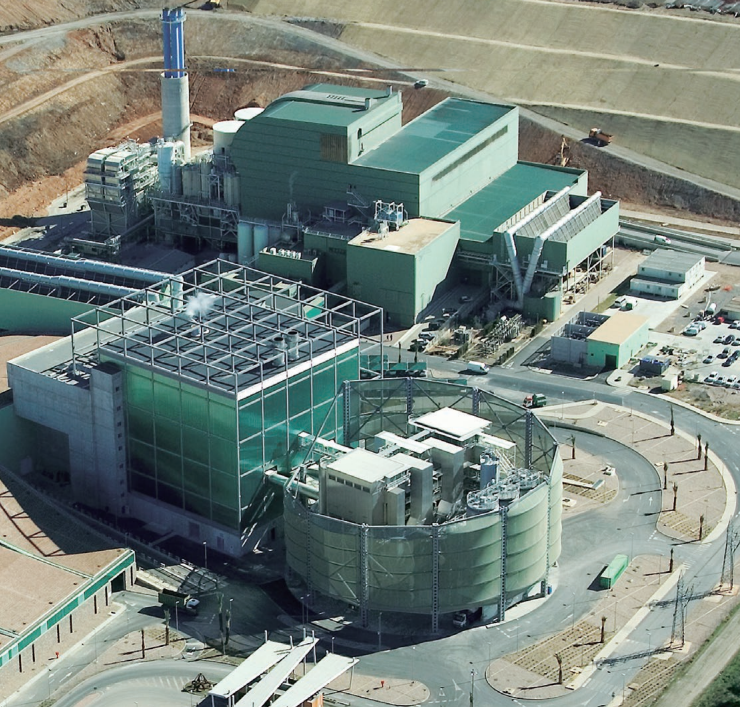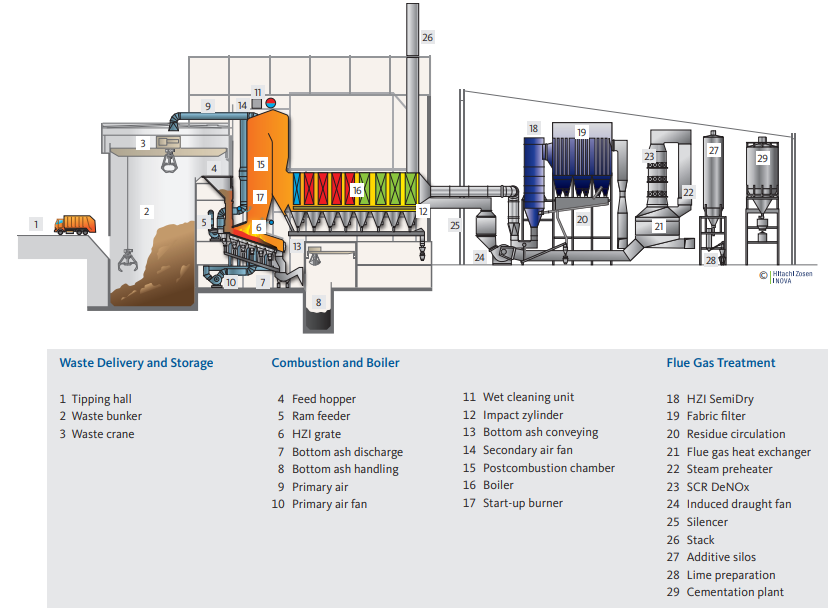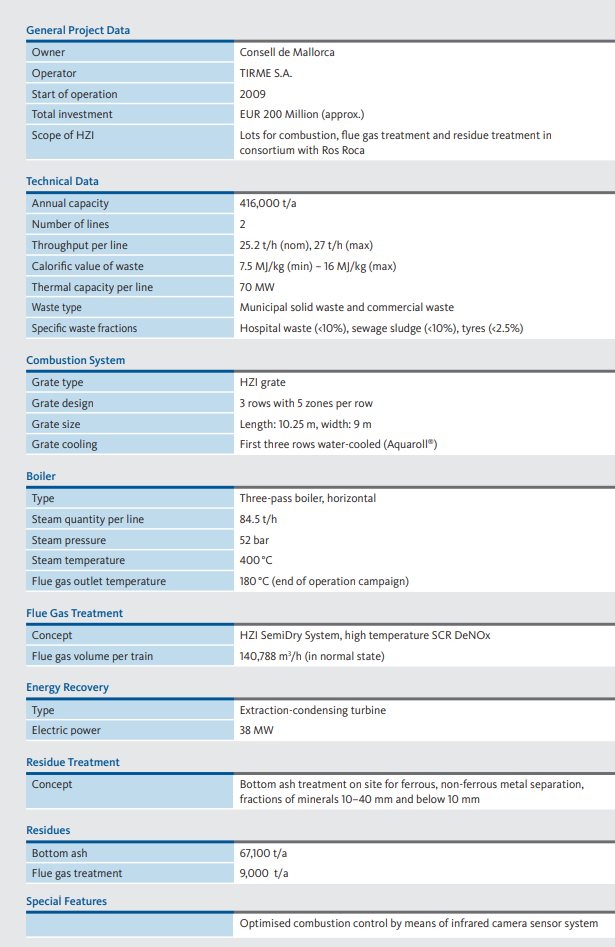Mallorca / Spain
Mallorca / Spain
Waste to Energy –Key Element for the Integrated Waste Treatment Concept on the Balearic Islands

The Balearic Islands – known for their Mediterranean climate and diversified sceneries – are a centre of attraction for millions of tourists. The significant number of island guests causes the population to vary between about 1 million in winter and 6 million in summer. This poses a challenging task for the proper and reliable disposal of daily waste.
Modern Waste Management
TIRME S.A., a company founded in 1991, addressed the problem of local waste disposal with an integrated waste management concept. As a core element of the concept, TIRME created the “Parque de Técnologías Ambientales
de Mallorca”. The center receives all local waste streams. The waste is sorted and separated for recycling and residual waste either disposed of on landfill or treated by biological or thermal processes. The different plants were continually extended and improved with the target of an independent and progressively sustainable insular waste treatment system.
A further milestone was the necessary extension of the capacity for the complete treatment of residual waste. For this purpose, TIRME decided to build two new Waste to Energy plants (WtE) on the site of Son Reus.
Kanadevia Inova and its local Spanish partner Ros Roca S.A. received in mid-2007 the order for the engineering, procurement and construction of the main lots for grate combustion and boiler as well as for flue gas and residue treatment.
The new lines 3 and 4 designed for a throughput of about 416,000 t/a of municipal solid waste (MSW) and commercial solid waste started operation in January 2010. Both lines extend the existing capacity of line 1 and 2 up
to about 800,000 t/a, thus enabling TIRME to reach an almost complete material and energetic recycling of the waste produced on Mallorca.
Thanks to the mechanical treatment plant for bottom ash, finished at the same time, the remaining ash is mostly recycled and used, for instance, in local street construction. This minimized residue from the modern flue gas treatment is stabilised and stored securely on site.
Renewable Energy for the Largest Balearic Island
Energy from MSW is normally up to 50% recovered from biogenic sources and therefore renewable.
The heart of such a modern Waste to Energy plant is the robust and reliable grate combustion of Kanadevia Inova by which the waste is transformed into thermal energy. The measures of pre-sorting and separation contribute to an increased
calorific value of the fuel. The proven forward reciprocating grate in the Mallorca plant is therefore water-cooled in the first three and air-cooled in the last two zones. The thermal energy released is recovered in the subsequent
boiler, producing super-heated steam which is used to produce electrical energy in a condensing turbine.
Optimum Plant Design – Economic Operation
For experienced clients like TIRME the reliability of the furnace and the boiler are key elements for economically successful operation. The perfectly adjusted co-action of each component of the Kanadevia Inova grate combustion system
allows very stable and steady steam production. In order to further increase the combustion control quality, TIRME decided to implement Kanadevia Inova’s infrared camera-based Combustion Control system, which enhances
the standard combustion control. The system measures the actual fire position and delivers information for optimised control parameters. The result is an improved control quality in steam flow by about 2%. TIRME further put emphasis on a reduction of the necessary time for yearly revisions. Their average time length is defined by the duration of a manual boiler cleaning. In the new plant, manual boiler cleanings will only be necessary every 12,000 operating hours instead of the usual 8,000 operating hours.
Flue Gas Treatment for High Energy Efficiency and Low Emissions
Water is a limited resource on Mallorca. The use of water must be sustainable in order to secure the welfare of the island in the long run. To comply with this requirement, the proven Kanadevia Inova SemiDry flue gas treatment is designed to work at lower inlet temperatures and a lower quench temperature step. This measure slightly reduces the utilisation efficiency of the lime. The slight increase in lime stoichiometry is counterbalanced by lower water consumption and
improved overall energy efficiency of the plant. It does not influence the effective reduction of the acid contaminants which are well below the European emission directives. The injected calcium hydroxide is only prepared on site by the hydration of quick lime – another economical highlight of the plant as operating costs for lime supply are significantly reduced. Besides lime, activated carbon is injected into the raw flue gas for the effective elimination of dioxins,
furans and heavy metals from the gas. All solid particles are separated in a fabric filter from the gas. The solid residues are extracted from the process and stabilised in a solidification process by the addition of cement. Subsequent to
the SemiDry process is a selective catalytic reduction process for nitrous oxides. The process step is equipped with an energy efficient reheat of the flue gas flow – the temperature increase by means of steam is limited to 20 Kelvin, any other heat in order to reach the operating temperature is recycled internally. Inside the catalyst, the injected ammonia water reduces the nitrous oxides far below European standards. The cleaned gas is then conveyed by the ID-Fan to the stack where it leaves at a temperature of about 160°C. With their new plants, TIRME is able to fulfil the requirements of an up-to-date waste treatment and recycling concept in line with the European directives and Spanish
legislation.

